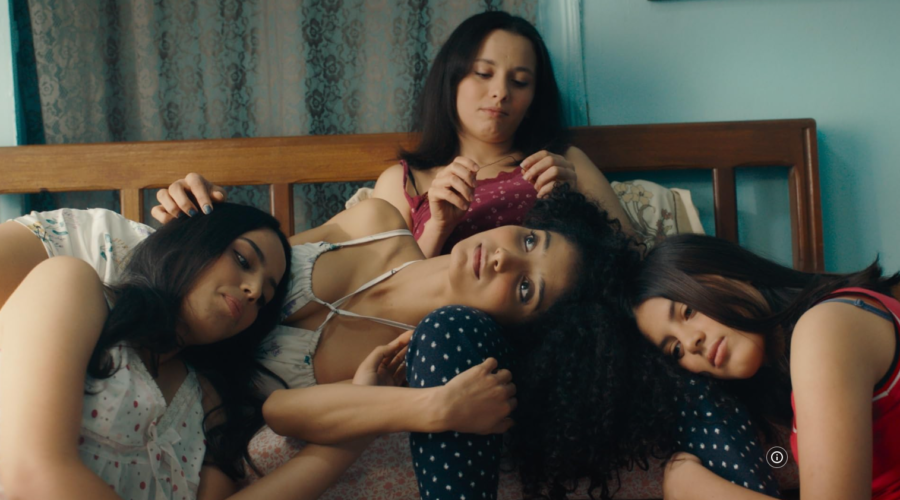Co-winner of the Cannes ’23 Golden Eye, Kaouther Ben Hania’s Four Daughters is a “fictional documentary” as compelling as it is troubling. The film stars a pious Tunisian mother named Olfa and her two (secular-leaning) youngest daughters, Eya and Tayssir. And also their two elder (religiously zealous) siblings Ghofrane and Rahma; though they are played by a pair of professional actors, Ichraq Matar and Nour Karoui, since the sisters are unable to speak for themselves onscreen, having “disappeared” as teenagers nearly a decade ago. As the film attempts to piece together the events – sometimes traumatic, which is when acclaimed actor Hend Sabri (Noura’s Dream) steps in to serve as Olfa’s double – leading up to the heartbreaking loss, painful secrets emerge. Along with the often-at-odds stories they tell us, the public at large, and of course themselves.
For by the time the Oscar-nominated Tunisian writer-director (The Man Who Sold His Skin, Beauty and the Dogs) met the female trio they were already well-known media figures. Indeed, Olfa – every bit as forceful as she is faithful to the Islamist traditions bent on holding strong-willed women like her down – seems pretty much to have perfected the role of “grieving mother” in an understandable attempt to bring sympathetic attention to the family’s plight. Which only makes Four Daughters all the more intriguing, especially with Olfa now freed from the burden of “playing” herself.
Admissions unspool: “I taught them to aim and they shot me,” she reflects in one rare moment of “truth” about raising her girls to be both tough and observant. Ironically, it was this very strength that allowed her two eldest to eventually wield religion as a weapon to dominate a domineering mother. A weapon that ultimately proved too powerful for anyone to control.
Towards the tumultuous end Olfa poignantly notes that female felines are so afraid for their babies that they will eat them. “I didn’t eat them but I lost them,” she candidly confesses. Which (also perhaps ironically, considering same-sex relationships are illegal in Tunisia) reminded me of a scene from another far-different (Sundance) award-winning documentary, D. Smith’s Kokomo City. In that Black trans sex worker-centered portrait, a protagonist speaks to the fear fierce Black mothers have for their sons – especially when those sons become daughters. Which can trigger a strange desire to “beat” the femininity out of their kids rather than, say, to productively fight the Man’s system keeping them all in their “place.”
When viewed through this lens, Four Daughters is at its core a most unusual exploration of the dynamics between matriarchal-led families and feminism itself. And all the messy myriad contradictions that will always inherently entail in our patriarchal world.

